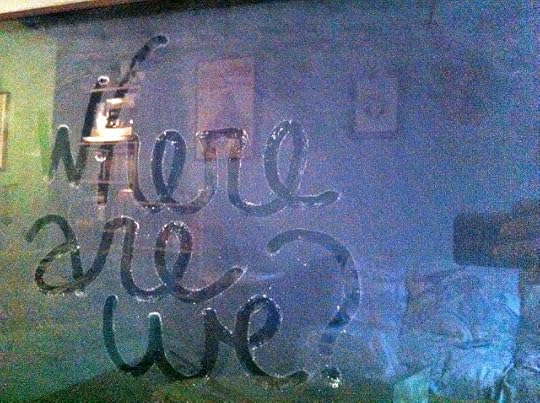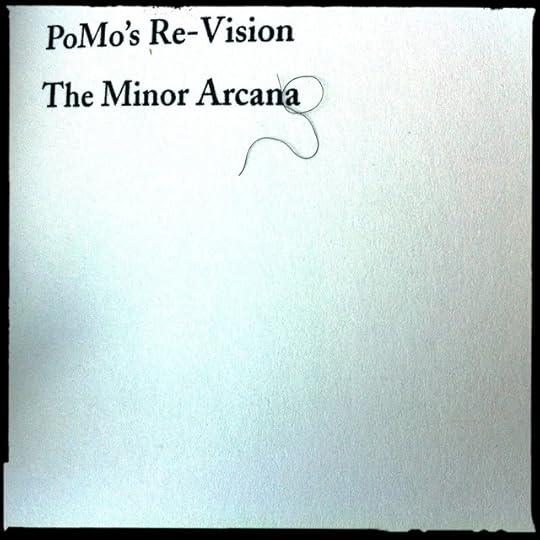Theogony Recapitulates Cosmogony
 Geof Huth, "where are we? (version 2)" (4 November 2011)
Geof Huth, "where are we? (version 2)" (4 November 2011)Written on Two Delta Flights: JFK to SLC and SLC to PDX
The title of this attempt at a review of Douglas Rothschild's book of poetry, Theogony, a text that seems to avoid criticism by being both all things as well as often being flagrantly apoetic, is an old saying of mine, and an important one. If you want to define the settledness of existence (are we not all solipsists at heart?) by defining first things, you'll always find that you cannot define a believable inception, only a continuance.
Douglas' book is not so much a book as seven books. Thematically, they cohere in interesting ways, even if sometimes provincial ones, but stylistically there is a wide range. Douglas has inscribed my book thusly:
October 28/11And I did enjoy all seven of these books, for various reasons, in various ways, which I might be able to explain through a process of emulation:
Dear Geof,
Two EBay or not
Two Ebay that is the
Question. Weather or
Not weather is it more
important to shovel or
Leave town.
Hope you enjoy this book
[signature replicating a desultory paraph]
Textual Queries
Moored not mired
in smallness that
"if long beetled up"
might foment but
the question lofts
without lifting the
words come with
faces of gulls and
dirty water thinking
and quoting forth
not froth
Christmas Book
Well like my eXmaSscards that mark not Christmas
(X'd or not) or winter solstice (given me not another
religion to replace the one I've already dispensed with,
and don't think my gods'd be sylvan over oppidan)
or even year's end since any ending made per annum
(though not the processeses therein) is based on centuries
of arbitrary actions of thinking—
these poems move against articles of faith by
ignoring them, and toward
a sense of self in place, not stable, nor stasis, tho
movement is mostly of mind and eye, resulting in
actions of thinking somewhat sad, of, say, the poet's
own personhood, but more broadly of society
and infrastructure (is Douglas the great poet of
infrastructure?), and all the sadder for the fact that
when it rains near Christmastime, it always rains
cold
Last Day at Work: Trip to X-Towers
i tell a story only of
a set of poems I've read
so not telling those of
how I saw 9/11 through
a blurry TV screen
then a week or so later
as craters. Douglas tho
sees it as a place of his
often going. He returns,
there is a badpennyness
to him, to that place and
thoughts engendered with
strange linebreaks strong
for there wrenchtness,
but why these misspellings?
do they have meaning?
are they intentional?
"momento"
"911" for "9/11"
(a minimalist i, so i see
significance in the slightest
change of sign or signification)
see how what we make
makes us
& with Douglas we see
the provincialness of New
York (cf. Saul Steinberg's
view of New Yorkers' view
from 9th Avenue). Everything
so small and given over to
rubbish.
FEBRUARY 28, 2001
Lines lengthen for some sections as they shrink for others. The guy
in the seat ahead of me has just reclined his seat into my laptop
screen, making it a little more difficult to type into the V of my
computer. Everything valley and valiant.) Douglas plays more,
in this middlest book with language. So we have his discovery of
"Pierage" as New York's piers are gentrified, and the echo out
from "Peerage." He is the poet of the 99% (or the 75%), frowning
at both the overcaring given the rich in this country and
all the irrational thinking that makes it work. All of which thoughts
come out of the small things of the world: handwritten signs,
for instance.
And in this section is the greater book's third reference to "the
figure 5," reminding me not of Williams (WC), but of Ted
Berrigan's recurrent 5:15 am—maybe because an occasional
character is Ted's son Anselm, who might walk some nights
with Douglas, even if never speaking Finnish once.
Poems from a Green Notebook
Water there is in many of these poems
taken along a river and night in the sense
of darkness if not sleep. His is the urban
nightscape and riparian, the city slowing
giving way to the water always moving,
a permanence to it, and a lonelinesss, for
except when Douglas is funny or angry
(always coterminous) there is a melan-
choly sense to his adumbrations (sad
but a calming sadness, "not complete but
continual forgetfulness"). Douglas is
not a language poet, not a lyric poet,
and neither is he neither of those things.
He doesn't postcede any before who came
after those who had come before and he
doesn't pass anyone who has passed him
or out and he doesn't be except himself.
Pomo's Re-Vision
The process of extending a process also in place
is the fact of remaking the made
In this book the poems function in blocks and breakup into scattered sections of words, language brokeninto incohereable pieces that do not create continuances of language
in thewith aby thefor a
to aa toto a
for thethe forfor the
night
It is the play of languagethe play of the tongue
Here he starts in with humorhis righteous voice rising in a couple of poemswith "9/11" in their titles
Here are references out to poemswe'll never know the straw man of(but certainly not Eliot)
everything fragmentsand fractures
Poems as titleswith epigraphs withsingle lines referringto something thena footnote to send usfurther astray
At play in the field of the Word
HereDouglas uses "then"for "than"
 A g I Found in My Copy of Theogony (Yes, I Know What the g is Made Of)
A g I Found in My Copy of Theogony (Yes, I Know What the g is Made Of)The Minor Arcana
Douglas presents himself as Jack Spicerwith Lorca: a woman named Mara Gilbert(who may be this actress who is a friendof Tony Dohr, AKA Douglas Rothschild)opens the book with an explanatory essayabout this set of 56 numbered poems, which could be an essay by himself.
1
Hey, each one of these is numberedin the book, so each one of my micro-reviewsis numbered here. Can you not understandhow this works? It is a process of convergencebetween the writing and the reading. Eachact of reading being a subsequent actof writing the reading out of oneself.
2
This book sounds like Douglas, he talks as
he speaks, he yells as he shouts:
"i was like, NO! NO! It's Steinbrenner.
Doesn't anyone remember?" which is pure
Douglas. I've heard him speak in this way
many a time. He is a political ranter, and
the politics is politics or capitalism (the
difference is?) or poetry or the media.
3
He rants against the media. Against us,
against Americans so afraid that they'll
give up any right to pretend they are safe.
Against the calculus of fear that keeps
people docile, even when they seem
angry. This is all pre-Tea-Party, pre-
Occupy-Wall-Street, pre-Occupy-
Oakland-and-Shut-Down-Its-Port,
but it presages it. Douglas was angry
before most of us were, and his is
a kind of political poetry so specific,
so specific in the details of its rancor
that we might not be able to under-
stand it
fifty years from now, but it has thesound of something real. (For 1980szinesters, there's something in the cadence and language of these poemsthat reminds me of the White Boy poems of Paul Weinman.)
4
I worry about poets who are, as I say,"trapped by their tropes," who do overagain what they've done so often before.Douglas' poems cohere somewhat inlanguage, yet this rambling (becausemultiply-focused) rant of his is something different than what's come before.
The bile has risen higher, the languagehas been stripped of its poetry so thatthe poetry is the outrage itself, he speaksnow in the cadence of a preacher againstevil in Washington Square Park, he isall colloquialism and slang, the languagethwacks against the side of the head,then thwacks again, it's a poetry writtenas if poetry actually matters, and
we have to thank Douglas for that.
5
The most I ever do in this regard is to mock
the language of politics, which is shrewd
without being careful or meaningful to us:
thus this tweet of mine from today:
This tweet from NYGovCuomo is the problem with government today: "Governor Cuomo Reports 98 Percent of Power Outages Restored." Why put forth so much effort to restore something no-one wants. Who's ever said, "Give us back our power outages"?
Douglas could do better.
***
Douglas ends the book with a prose coda, in two columns per page (and we have to assume the columns are meaningful). In this, he discusses how people tried to make sense of the attacks on the World Trade Center, and he demonstrates how any deeper meaning is immediately undermined, that it carries no meaning, only carnage from external sources followed by carnage from within. (I'm paraphrasing, extending, reading what I see within his words.) It's a totally serious piece of writing, devoid of humor or arch statements. And it ends with one rabbi's statement that he would read the messages of those people in the World Trade Center on September 11th who knew they wouldn't escape, those messages out to their family, and how the rabbi believed that reading those statements taught him the meaning of this event. And then Douglas quotes two of those messages, voicemails, I assume: one that sounds like a man's message to his wife, another that sounds like a young woman's message to her mother. They are both messages of love, they both indicate that the speakers expected to die, they were both messages of goodbye, and they are short and simple. But they give no meaning to the event. People were murdered en masse, followed by the problems of a country dealing with these murders in ways that often made things worse.
A powerful ending to a book that is really just a human book about living. Maybe Douglas is simply a lyric poet (the "i" [never "I"] is always him). Or maybe he is the crazy man talking in the subway train, which moves through veins of darkness carrying all the light within its body.
ecr. l'inf.
Published on November 04, 2011 15:19
No comments have been added yet.



